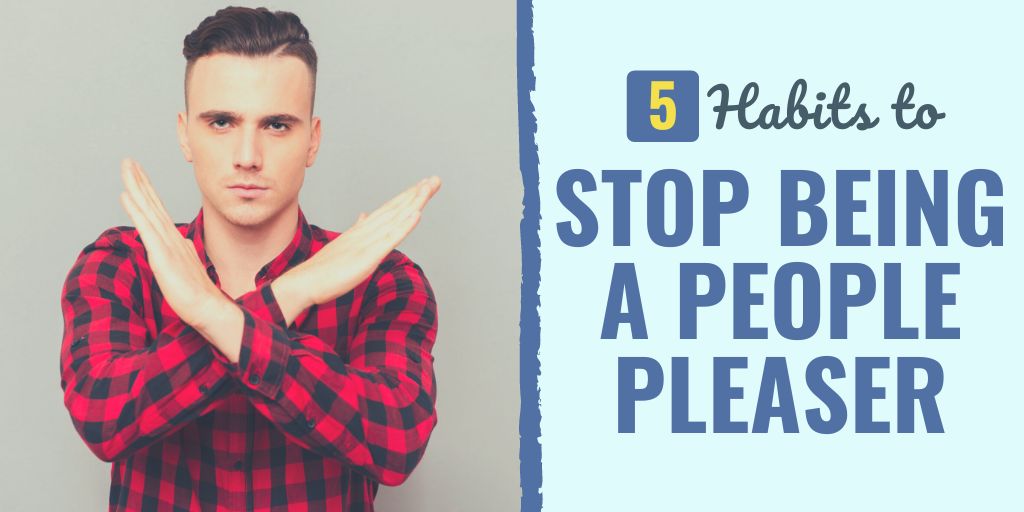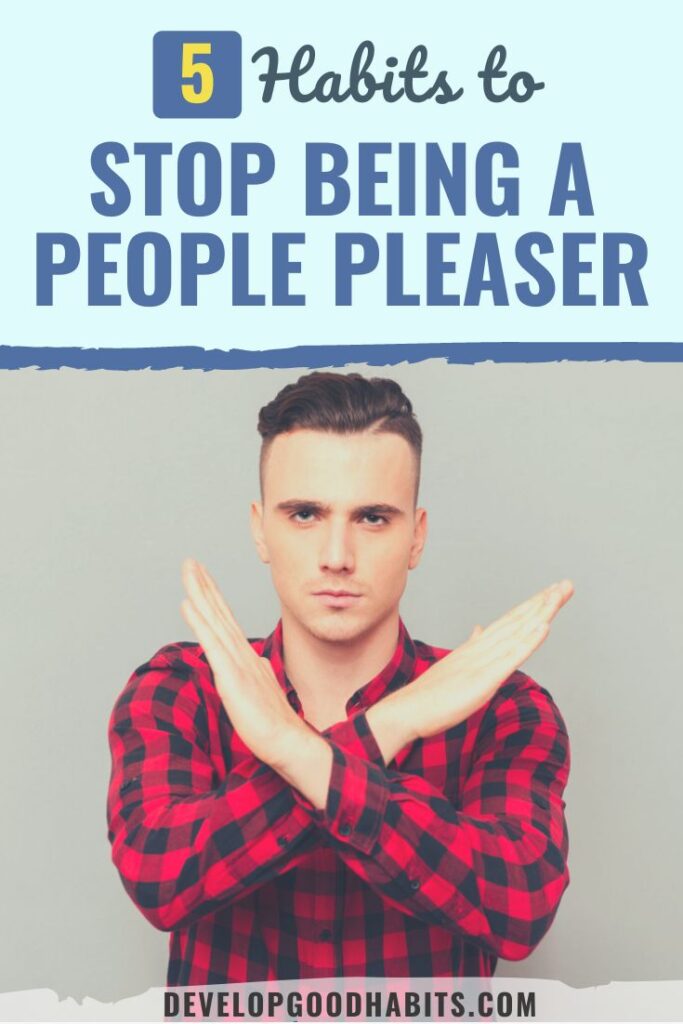There might be affiliate links on this page, which means we get a small commission of anything you buy. As an Amazon Associate we earn from qualifying purchases. Please do your own research before making any online purchase.
Why do we say yes to things that we really don’t want to do?
A new coworker asked me to go out for some drinks after work one day a few weeks ago. I like her, I enjoy being with her, and I’ve come to consider her a friend. However, my first thought was, “What? No way! No.”
But what’s the harm in hanging out with a work friend outside of the office?
The truth is, all I want to do after work is go home and put my pajamas on and see my daughter. I really don’t want to talk about work anymore and I definitely don’t want to be in another noisy environment.
But I agreed to go because she wanted to. I didn’t want to go through the back and forth of her asking again or her asking why I couldn’t go and then having to admit it was literally just because I didn’t want to.
The truth is, I was people pleasing.
Now, this isn’t something I always do. I wouldn’t even say this is something I usually do. But I am definitely familiar with that feeling of giving in to either spare someone’s feelings or to avoid a harder conversation.
People pleasers worry about how other people may perceive them if they say no. And while people pleasers don’t want to be seen in a negative light, they often don’t realize that this tendency can come along with both physical and mental health risks.
In this article, we are going to look at how aiming to please people can go a step further and become destructive behavior. We will explore the downside of being too much of a people pleaser and why you should avoid doing this.
Then, we will look at 5 actionable habits you can employ to stop being a people pleaser.
Let’s get started.
What Is a People Pleaser?
A people pleaser is someone who goes to extreme lengths and puts their own desires aside to make other people happy. They do this because deep down, they fear abandonment or rejection from the ones they love.
But by going to great lengths to avoid conflict, they often end up putting up with poor treatment from others, and even get taken advantage of because people know they will agree to go along with whatever is asked of them.
Some common traits of people pleasers include:
For many people pleasers, the need to please others derives from a need for acceptance due to a lack of self-worth. People pleasers hope that by agreeing to help other people, they will be appreciated and liked.
This becomes an issue when people confuse pleasing people with generally being kind, and start to lose out on their own life because of it.
And this is a key point: kindness only occurs if you have no personal agenda behind your actions. You're only acting out of kindness when you're being completely selfless by putting someone else's needs before your own…and you don't have a second thought about it.
For example, if a coworker asks you to pick up some of their slack, you may agree in hopes that they will give you a hand in the future.
Or, you may not expect them to help you in return, but you want to avoid looking like you’re not a team player. If you agreed to help your coworker, this act would not be done out of kindness.
Now consider if your child needs some help with a school project because he values your opinion and is not confident in his work so far. In this situation, you're likely to jump at the opportunity to help without expecting him to do anything for you in return. This is a kind act.
The Downside of Being a People Pleaser
People-pleasing may seem nice and harmless, but it can have serious consequences. Often, people pleasers are so preoccupied with keeping everyone else happy that they forget about their own needs and values.
“Don’t set yourself on fire to keep others warm.”
This puts pressure and stress on you as you commit yourself to doing all of these things for other people and are then left to do everything that you need to do for yourself alone.
This can be overwhelming and you can run yourself down by doing too much–both mentally and physically. When you overcommit yourself, you lose sleep and have a greater chance of experiencing anxiety. Having this burden build up can lead you to feel resentment toward the people you're trying to please.
People pleasers also use up all of their mental energy while helping other people work toward their goals, leaving very little time and energy to spend on their own goals. In fact, people pleasers may even begin to believe other people's goals are more important than their own.
No one can do it all, and you can only help other people if you are the best version of yourself.
Let’s look at how you can turn this behavior around.
5 Habits to Stop Being a People Pleaser
1. Increase Your Self-Awareness
You can only change your behavior if you recognize it, so be willing to accept your personal truths.
Take an objective look at your potentially people pleasing behavior and ask yourself the following questions:
When you consider your answers to these questions, you're giving yourself an opportunity to learn from them. This can give you more control over your impulse to keep other people happy.
Take a few minutes to watch the video below and learn about the 5 proven strategies you can use to understand yourself better.
2. Wait Before Responding
If you're a people pleaser, you already know that it can be hard to say no. But instead of agreeing to everything right away, buy yourself some time to think it over and make an informed decision.
Say something like, “Let me get back to you tomorrow after I look at my calendar.” You’ll also want to ask the person for more details about exactly what they’re asking you to do.
Then think about whether or not agreeing to the request is the best decision for you.
Is this commitment worth your time and energy?
Why are you considering saying yes?
If it is to avoid having a conflict or just so the person will like you, really consider declining.
It's easy for people pleasers to recognize other people's needs and wants, but more challenging to identify their own. But if you give yourself some time to sit with the decision instead of answer impulsively, you're less likely to agree to do something that you're doing for the wrong reasons.
By refraining from saying yes right away, you're not committing yourself to meeting someone else’s needs before having a chance to think about yourself and how you want to spend your time.
Consider what you will be sacrificing if you agree to do whatever this person is asking you and if it’s possible you may hold a grudge against the person in the future because of it.
And, if the person needs an immediate answer, your new default answer is no. This leaves you the option to change your mind later. If you say yes, you’re stuck with it.
3. Practice Self-Care
In order to stop being a people pleaser, you have to shift your focus from other people to yourself.
One effective way of doing this is to make practicing self-care part of your normal routine, because it’s easy to neglect yourself when your concern is about everyone else. But as you probably know, you can’t take care of other people if you don’t take care of yourself first.
Practicing self-care is a critical component to putting a halt to your people pleasing behaviors. This means you need to make your physical and mental needs a priority so you can learn to develop respect for yourself, your goals, and your time.

When you focus on yourself, you may also be able to find a sense of self-worth internally rather than having to seek validation from outside sources.
4. Create Boundaries
When your relationships have clear and healthy boundaries, you have a much smaller chance of feeling used by the people in your life. Creating boundaries with yourself and other people will help you feel more confident in your decisions and less resentful toward the ones you love.
Alternatively, when you allow people to cross your boundaries over and over, you will bottle up frustration until you lash out.
For example, if your friend always calls you while you’re at work just to chit chat about her day, you may start to get behind on your work and begin to resent her for not recognizing and respecting the fact that you’re busy.
To fix this, you could set a boundary by saying you will only answer the phone after 5:30 (or whenever).
You can phrase it in a way that shows her you would rather be able to give her your full attention instead of being distracted at work if you don’t want to be brutally honest.
Another way to create a boundary is to set a timeframe when someone asks you to do something.
Let’s say a friend wants you to help them move over the weekend, and because you’re close with this person, you don’t want to say no–but you also have some things you want to get done for yourself.
Set a boundary by saying you’re only free on Sunday from 11:00-2:00 (or whatever you’re willing to do). Be clear when you’re communicating this and stick to it.
Boundaries are a recognition of whatever truth is happening inside your mind, so don’t be afraid to set them and stick to them. It may take a while to adjust, but you’ll feel better once people learn and accept the boundaries you set.
5. Be Assertive… Empathically
If you’re a people pleaser, you probably feel like you have to justify it every time you say no. After all, you want the other person to understand you have a good reason to decline their request!
But doing this can end up backfiring because as soon as you start to list off your excuses, the other person could respond with potential solutions to this “predicament” in your schedule.
And if they try to argue that your current commitment isn't as important as what they're asking, then you're really in a bind.
If you can learn to be assertive in a nice way, you won’t feel like you owe anyone an explanation. When you’re assertive, you’re able to calmly stick up for your needs.
And when you’re empathic, you can understand how other people may be feeling. So when you’re empathically assertive, you can acknowledge someone else’s feelings before making a statement that allows you to stand up for yourself and your own needs.
The video below shows you five strategies you can use to say no often and effectively.
Let’s go back to the example of the friend who is moving. You can respond to this request with empathic assertion by saying something like, “I know how stressful moving is, but I have another obligation this weekend.”
This sounds a lot more caring than a simple, “no”. In a way, you’re suggesting that you wish you could help, but something else has to take priority for you.
When you demonstrate this level of assertion, you’re not being rude. You’re making a connection with the person by acknowledging the stress of their situation so they know that you understand their feelings, but unfortunately, you aren’t able to do everything they’re asking.
Ultimately, people just want to feel heard, so if you show them you understand, they will recognize you’re being respectful of their feelings, which they will appreciate.
Final Thoughts on How to Stop Being a People Pleaser
Try to build these habits to stop spending your energy trying to please other people and start focusing on yourself. As soon as you can stop trying to please everyone else, you will gain the necessary time and energy to work on your own goals and do the things that make you happy.
And honestly, the very first time you say no to someone will be the hardest. However, as soon as you're past this little hump and you see how this newfound freedom can benefit you, you will probably have no trouble moving forward with this new behavior.
Just keep in mind that there is a reason you're saying no to some requests– you want that time back for yourself and you want the energy to be able to help those whom you truly want to help.
And if you're looking for more resources to help increase your self-awareness, be sure to read these articles:
- 9 Examples of Self Awareness Throughout Your Life
- 33 Self-Awareness Activities for Adults and Students
- 19 Self-Awareness Tests to Truly Understand Yourself

Connie Mathers is a professional editor and freelance writer. She holds a Bachelor's Degree in Marketing and a Master’s Degree in Social Work. When she is not writing, Connie is either spending time with her daughter and two dogs, running, or working at her full-time job as a social worker in Richmond, VA.


